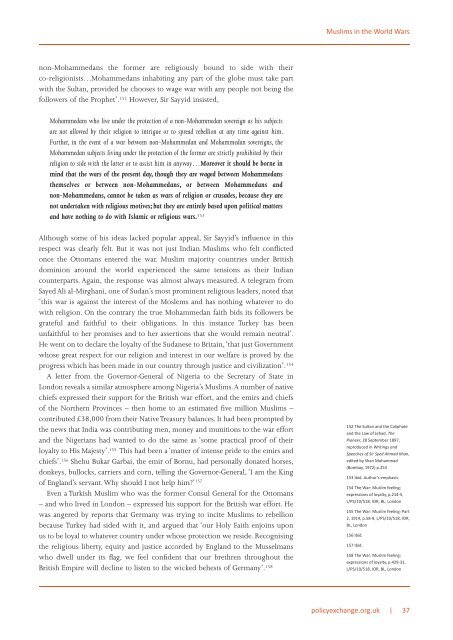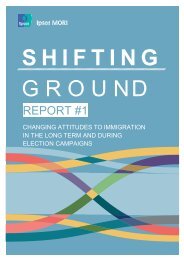You also want an ePaper? Increase the reach of your titles
YUMPU automatically turns print PDFs into web optimized ePapers that Google loves.
non-Mohammedans the former are religiously bound to side with their<br />
co-religionists…Mohammedans inhabiting any part of the globe must take part<br />
with the Sultan, provided he chooses to wage war with any people not being the<br />
followers of the Prophet’. 152 However, Sir Sayyid insisted,<br />
Mohammedans who live under the protection of a non-Mohammedan sovereign as his subjects<br />
are not allowed by their religion to intrigue or to spread rebellion at any time against him.<br />
Further, in the event of a war between non-Mohammedan and Mohammedan sovereigns, the<br />
Mohammedan subjects living under the protection of the former are strictly prohibited by their<br />
religion to side with the latter or to assist him in anyway…Moreover it should be borne in<br />
mind <strong>that</strong> the wars of the present day, though they are waged between Mohammedans<br />
themselves or between non-Mohammedans, or between Mohammedans and<br />
non-Mohammedans, cannot be taken as wars of religion or crusades, because they are<br />
not undertaken with religious motives; but they are entirely based upon political matters<br />
and have nothing to do with Islamic or religious wars. 153<br />
Although some of his ideas lacked popular appeal, Sir Sayyid’s influence in this<br />
respect was clearly felt. But it was not just Indian Muslims who felt conflicted<br />
once the Ottomans entered the war. Muslim majority countries under British<br />
dominion around the world experienced the same tensions as their Indian<br />
counterparts. Again, the response was almost always measured. A telegram from<br />
Sayed Ali al-Mirghani, one of Sudan’s most prominent religious leaders, noted <strong>that</strong><br />
‘this war is against the interest of the Moslems and has nothing whatever to do<br />
with religion. On the contrary the true Mohammedan faith bids its followers be<br />
grateful and faithful to their obligations. In this instance Turkey has been<br />
unfaithful to her promises and to her assertions <strong>that</strong> she would remain neutral’.<br />
He went on to declare the loyalty of the Sudanese to Britain, ‘<strong>that</strong> just Government<br />
whose great respect for our religion and interest in our welfare is proved by the<br />
progress which has been made in our country through justice and civilization’. 154<br />
A letter from the Governor-General of Nigeria to the Secretary of State in<br />
London reveals a similar atmosphere among Nigeria’s Muslims. A number of native<br />
chiefs expressed their support for the British war effort, and the emirs and chiefs<br />
of the Northern Provinces – then home to an estimated five million Muslims –<br />
contributed £38,000 from their Native Treasury balances. It had been prompted by<br />
the news <strong>that</strong> India was contributing men, money and munitions to the war effort<br />
and the Nigerians had wanted to do the same as ‘some practical proof of their<br />
loyalty to His Majesty’. 155 This had been a ‘matter of intense pride to the emirs and<br />
chiefs’. 156 Shehu Bukar Garbai, the emir of Bornu, had personally donated horses,<br />
donkeys, bullocks, carriers and corn, telling the Governor-General, ‘I am the King<br />
of England’s servant. Why should I not help him?’ 157<br />
Even a Turkish Muslim who was the former Consul General for the Ottomans<br />
– and who lived in London – expressed his support for the British war effort. He<br />
was angered by reports <strong>that</strong> Germany was trying to incite Muslims to rebellion<br />
because Turkey had sided with it, and argued <strong>that</strong> ‘our Holy Faith enjoins upon<br />
us to be loyal to whatever country under whose protection we reside. Recognising<br />
the religious liberty, equity and justice accorded by England to the Musselmans<br />
who dwell under its flag, we feel confident <strong>that</strong> our brethren throughout the<br />
British Empire will decline to listen to the wicked behests of Germany’. 158<br />
Muslims in the World Wars<br />
152 The Sultan and the Caliphate<br />
and the Law of Jehad, The<br />
Pioneer, 28 September 1897,<br />
reproduced in Writings and<br />
Speeches of Sir Syed Ahmad Khan,<br />
edited by Shan Mohammad<br />
(Bombay, 1972) p.253<br />
153 Ibid. Author’s emphasis.<br />
154 The War: Muslim feeling;<br />
expressions of loyalty, p.214-5,<br />
L/PS/10/518, IOR, BL, London<br />
155 The War: Muslim feeling: Part<br />
2, 1914, p.58-9, L/PS/10/518, IOR,<br />
BL, London<br />
156 Ibid.<br />
157 Ibid.<br />
158 The War: Muslim feeling;<br />
expressions of loyalty, p.429-31,<br />
L/PS/10/518, IOR, BL, London<br />
policyexchange.org.uk | 37



